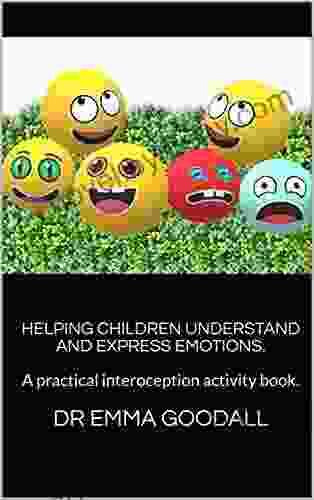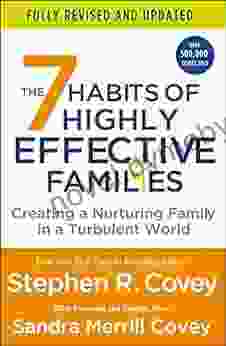Helping Children Understand and Express Emotions: A Comprehensive Guide

4.1 out of 5
| Language | : | English |
| File size | : | 4467 KB |
| Screen Reader | : | Supported |
| Print length | : | 928 pages |
Emotions play a crucial role in children's overall well-being and development. Understanding and expressing emotions effectively can help them navigate life's challenges, build healthy relationships, and achieve their full potential. This article explores a range of evidence-based strategies and techniques that parents, caregivers, and educators can use to support children in developing emotional intelligence.
Understanding Children's Emotions
The first step to helping children manage their emotions is to understand what they are experiencing. Here are some common emotions that children may experience:
- Happiness: Children feel happy when they are having fun, playing with friends, or spending time with loved ones.
- Sadness: Children may feel sad when they lose a loved one, don't get what they want, or feel alone.
- Anger: Children may feel angry when they are frustrated, mistreated, or challenged.
- Disgust: Children may feel disgusted by certain smells, tastes, or experiences.
li>Fear: Children may feel afraid when they are in danger, when they don't know what to expect, or when they face something new.
It's important to note that all emotions are normal and that children should be allowed to express them in a healthy way.
Effective Strategies for Supporting Children's Emotions
Parents, caregivers, and educators can play a vital role in helping children understand and express their emotions. Here are some effective strategies:
Active Listening

Active listening involves giving your undivided attention to your child and showing that you are interested in what they have to say. This means making eye contact, nodding, and asking clarifying questions. Active listening helps children feel heard and validated, which can make them more likely to open up about their emotions.
Using "feeling words"
- Sad: I feel down, blue, or gloomy.
- Angry: I feel mad, frustrated, or annoyed.
- Scared: I feel afraid, nervous, or anxious.
By providing children with a vocabulary to express their emotions, you can help them to communicate effectively and build self-awareness.
Encouraging play and creativity

Play and creativity offer children a safe and fun way to explore their emotions. Through imaginary scenarios, role-playing, and storytelling, children can express their feelings indirectly and develop coping mechanisms.
Setting limits and boundaries
While it is important to allow children to express their emotions freely, it is equally important to set limits and boundaries for acceptable behavior. Let children know that it is okay to be angry, but it is not acceptable to hit or name-call.
Seeking professional help when needed
If a child is struggling to manage their emotions, it may be helpful to seek professional help. A therapist can provide support and guidance to children who are experiencing difficulty regulating their emotions or dealing with challenging life events.
The Power of Emotional Intelligence
Developing emotional intelligence in children is essential for their overall success and well-being. Emotionally intelligent children are more likely to:
- Cope with stress and adversity effectively
- Build and maintain healthy relationships
- Communicate their needs and feelings clearly
- Set goals and achieve them
- Make responsible decisions
Helping children understand and express their emotions is a gift that will benefit them throughout their lives.
Supporting children's emotional development is a crucial aspect of parenting and education. By understanding children's emotions, using effective strategies, and fostering emotional intelligence, we can empower them to navigate life's challenges, build resilience, and lead fulfilling lives. Remember, happy children make for a happy future.
4.1 out of 5
| Language | : | English |
| File size | : | 4467 KB |
| Screen Reader | : | Supported |
| Print length | : | 928 pages |
Do you want to contribute by writing guest posts on this blog?
Please contact us and send us a resume of previous articles that you have written.
 Book
Book Novel
Novel Page
Page Chapter
Chapter Text
Text Story
Story Genre
Genre Reader
Reader Library
Library Paperback
Paperback E-book
E-book Magazine
Magazine Newspaper
Newspaper Paragraph
Paragraph Sentence
Sentence Bookmark
Bookmark Shelf
Shelf Glossary
Glossary Bibliography
Bibliography Foreword
Foreword Preface
Preface Synopsis
Synopsis Annotation
Annotation Footnote
Footnote Manuscript
Manuscript Scroll
Scroll Codex
Codex Tome
Tome Bestseller
Bestseller Classics
Classics Library card
Library card Narrative
Narrative Biography
Biography Autobiography
Autobiography Memoir
Memoir Reference
Reference Encyclopedia
Encyclopedia Sharon Linnea
Sharon Linnea Rocio Cadena
Rocio Cadena Robert K Brown
Robert K Brown Peter Ralston
Peter Ralston Wynne L Summers
Wynne L Summers Emiko Davies
Emiko Davies Serena Tyndall
Serena Tyndall Julia Emma
Julia Emma Roger L Williams
Roger L Williams Ron Stallworth
Ron Stallworth Sarah Glenn Marsh
Sarah Glenn Marsh Roger Boyes
Roger Boyes Tatiana Shestel
Tatiana Shestel Natalie Del Favero
Natalie Del Favero Phil Dunmeyer
Phil Dunmeyer Robin Givhan
Robin Givhan Robert J Mrazek
Robert J Mrazek Richard M Foxx
Richard M Foxx Ruth Galloway
Ruth Galloway Real Estate Exam Professionals Ltd
Real Estate Exam Professionals Ltd
Light bulbAdvertise smarter! Our strategic ad space ensures maximum exposure. Reserve your spot today!
 Allan JamesFollow ·13.7k
Allan JamesFollow ·13.7k Eric NelsonFollow ·10.5k
Eric NelsonFollow ·10.5k Harry HayesFollow ·2.3k
Harry HayesFollow ·2.3k Sammy PowellFollow ·17k
Sammy PowellFollow ·17k Shaun NelsonFollow ·18.5k
Shaun NelsonFollow ·18.5k Heath PowellFollow ·12.1k
Heath PowellFollow ·12.1k Christian BarnesFollow ·13.8k
Christian BarnesFollow ·13.8k Michael SimmonsFollow ·7.1k
Michael SimmonsFollow ·7.1k

 Mike Hayes
Mike HayesArthur Meighen: A Life in Politics
Arthur Meighen was one of Canada's most...

 Bryan Gray
Bryan GrayVindicated: Atlanta's Finest
In the heart of Atlanta, a...

 Houston Powell
Houston PowellHis to Defend: A Captivating Legal Thriller That Will...
An Unforgettable...

 John Green
John GreenUncover the Riveting Tale of "Hunted: Atlanta Finest" - A...
Prepare yourself for a...
4.1 out of 5
| Language | : | English |
| File size | : | 4467 KB |
| Screen Reader | : | Supported |
| Print length | : | 928 pages |
















